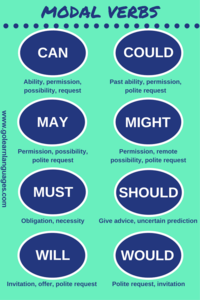
modal verbs
Flashcard
•
English
•
7th - 8th Grade
•
Practice Problem
•
Hard
+4
Standards-aligned

Wayground Content
FREE Resource
Student preview

15 questions
Show all answers
1.
FLASHCARD QUESTION
Front
What are modal verbs?
Back
Modal verbs are auxiliary verbs that express necessity, possibility, permission, or ability. Examples include can, could, may, might, must, shall, should, will, and would.
Tags
CCSS.L.4.1C
CCSS.L.9-10.1B
2.
FLASHCARD QUESTION
Front
What does 'must' indicate?
Back
'Must' indicates a strong obligation or necessity. For example, 'You must wear a seatbelt.'
Tags
CCSS.L.4.1C
CCSS.L.9-10.1B
3.
FLASHCARD QUESTION
Front
What does 'mustn't' mean?
Back
'Mustn't' indicates prohibition. It means that something is not allowed. For example, 'You mustn't smoke here.'
Tags
CCSS.L.4.1C
CCSS.L.9-10.1B
4.
FLASHCARD QUESTION
Front
What does 'can' express?
Back
'Can' expresses ability or permission. For example, 'I can swim.'
Tags
CCSS.L.4.1C
CCSS.L.9-10.1B
5.
FLASHCARD QUESTION
Front
What does 'can't' indicate?
Back
'Can't' indicates inability or prohibition. For example, 'I can't swim.'
Tags
CCSS.L.4.1C
CCSS.L.9-10.1B
6.
FLASHCARD QUESTION
Front
What does 'should' suggest?
Back
'Should' suggests a recommendation or advice. For example, 'You should study for the test.'
Tags
CCSS.L.4.1C
CCSS.L.9-10.1B
7.
FLASHCARD QUESTION
Front
What does 'shouldn't' mean?
Back
'Shouldn't' indicates advice against something. For example, 'You shouldn't eat too much sugar.'
Tags
CCSS.L.4.1C
CCSS.L.9-10.1B
Access all questions and much more by creating a free account
Create resources
Host any resource
Get auto-graded reports

Continue with Google

Continue with Email

Continue with Classlink

Continue with Clever
or continue with

Microsoft
%20(1).png)
Apple
Others
Already have an account?
Similar Resources on Wayground

10 questions
Boon Wurrung words
Flashcard
•
7th Grade

13 questions
FLASH CARD The Tale of Malin Kundang
Flashcard
•
6th - 8th Grade

16 questions
Mystery Terms Flashcard
Flashcard
•
7th Grade

14 questions
Appeasement
Flashcard
•
7th Grade

16 questions
Compounds some, any, no, every
Flashcard
•
8th - 9th Grade

15 questions
Functions
Flashcard
•
8th Grade

15 questions
04.08 CAD
Flashcard
•
7th Grade

12 questions
Organic 2 Exam 4 Review
Flashcard
•
KG
Popular Resources on Wayground

7 questions
History of Valentine's Day
Interactive video
•
4th Grade

15 questions
Fractions on a Number Line
Quiz
•
3rd Grade

20 questions
Equivalent Fractions
Quiz
•
3rd Grade

25 questions
Multiplication Facts
Quiz
•
5th Grade

22 questions
fractions
Quiz
•
3rd Grade

15 questions
Valentine's Day Trivia
Quiz
•
3rd Grade

20 questions
Main Idea and Details
Quiz
•
5th Grade

20 questions
Context Clues
Quiz
•
6th Grade
Discover more resources for English

10 questions
Exploring Valentine's Day with Charlie Brown
Interactive video
•
6th - 10th Grade

25 questions
7th Reading STAAR Vocabulary
Quiz
•
6th - 8th Grade

20 questions
Revising & Editing practice
Quiz
•
7th Grade

20 questions
Main Idea and Supporting Details
Quiz
•
7th Grade

24 questions
7th grade STAAR Reading Review
Quiz
•
7th Grade

15 questions
Theme
Lesson
•
3rd - 7th Grade

20 questions
Figurative Language Review
Quiz
•
8th Grade

12 questions
Final Figurative Language Review
Lesson
•
6th - 8th Grade